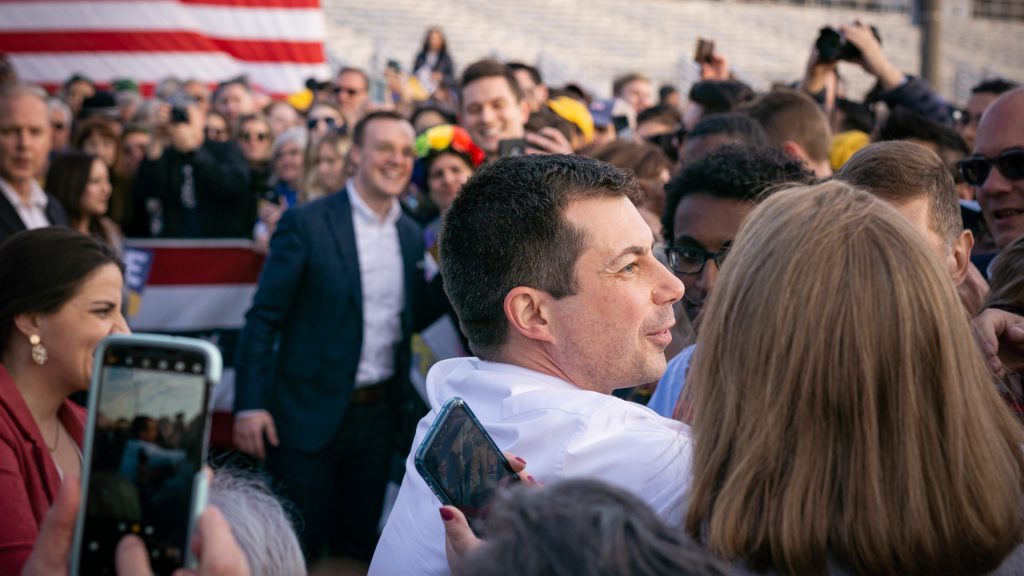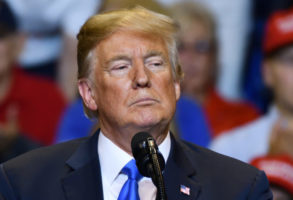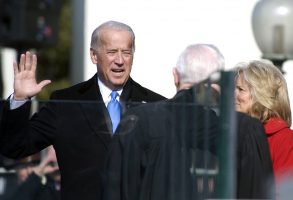
Published March 2, 2020
Pete Buttigieg and I disagree on many policies, which you might expect, because he describes himself as a progressive and I’m a conservative. I believe his views on abortion to be extreme, for example, and his approach to religious liberties to be uncompromising. But I can acknowledge those differences while also acknowledging the admiration I have for Buttigieg, who dropped out of the Democratic presidential race yesterday.
My admiration goes beyond the fact that in a field that at one stage exceeded two dozen, a 38-year-old former mayor of a city of roughly 100,000 people—who started the race a year ago without great personal wealth, no national base, and a staff of four—finished in the top four in the first four contests.
More impressive to me was the core theme of Buttigieg’s campaign, which he referred to as a “new kind of politics.” In the pre-Trump era, that may well have come across as an empty slogan; in the age of Trump, it captures an urgent national need.
During his campaign, Buttigieg spoke about what he called “rules of the road,” values that he wanted to make hallmarks of his candidacy and that included respect, responsibility, discipline, excellence, joy, and truth. This is what the Buttigieg campaign said about the latter:
Honesty is in our nature, and it is one of our greatest means of restoring faith in our democracy among everyday Americans and building a national movement rooted in trust and faith in our country and our beliefs. Internally and externally, our effort will be characterized by fidelity to the truth.
That is the kind of language and ethos that once would have appealed to Republicans, who now, under the spell of a president of corruptions without borders, have given up on virtue as a touchstone of political life. Politicians and presidents attempting to foster a climate of trust and mutual respect are snowflakes—or so many in the modern GOP and right-wing-media complex would have you think.
Buttigieg’s most impressive effort was his attempt to personify that campaign ethos, even if he did so imperfectly. One could see his commitment to these principles in his temperament. One example: Buttigieg, when he engaged with people who disagreed with him, was able to acknowledge why they held views different from his on opposing same-sex marriage. He stressed that how you vote doesn’t determine whether you’re a good or a bad person. That was once fairly widely assumed; in our current political climate, where contempt and antipathy toward others is fashionable, it’s something that needs to be said, and said again.
Even in hyperintense debates, as candidates were yelling at and over one another, Buttigieg managed to stay calm, cool, and dignified. (That didn’t mean he wasn’t able or willing to throw some sharp elbows, including at his fellow midwesterner, Senator Amy Klobuchar. And he also got off the most withering line of the campaign, referring to Vice President Mike Pence as a “cheerleader for the porn-star presidency.”)
Buttigieg seemed to understand intuitively what the American Founders and Abraham Lincoln understood, which is that the role of political leaders is to filter and refine public passions, rather than to stoke them; to be alert to the threat posed by angry populism; and to keep at bay institutional arsonists. In that sense, Pete Buttigieg is a person of quite a conservative disposition.
Buttigieg also grasps the deep purposes of politics. As he put it in his speech announcing his withdrawal from the campaign:
My faith teaches that the world is not divided into good people and bad people; [it teaches] that all of us are capable of good and bad things. Today, more than ever, politics matters, because leaders can call out either what is best in us or what is worst in us; can draw us either to our better or to our worst selves. Politics at its worst is ugly, but at its best politics can lift us up. It is not just policy making; it is moral. It is soul craft.
To be sure, the majority of moral formation and soul craft happens in areas outside politics, but nonetheless, an indisputable moral function is inherent in politics. To paraphrase James Madison in “Federalist No. 51,” the end of politics is justice. (Aristotle argued very much the same thing.)
Politics, then, is one arena, and a rather important one, that helps shape a nation’s norms, beliefs, and moral sensibilities. It signals to the rest of society what kind of behavior is honorable and dishonorable, admirable or ignoble, worthy of emulation or condemnation. It is here, in the realm of our civic and political culture, where the blast radius of the Trump presidency is most obvious, and where Donald Trump is doing some of his worst and most-lasting damage.
The most important revolution of all, the conservative British statesman Edmund Burke said, was a “revolution in sentiment, manners and moral opinion.” In that respect, Trump is a revolutionary, in a way that ought to alarm conservatives.
Within the past week, I was part of a conversation with an individual who at one time was a leading figure in Republican politics, but has since become a vocal critic of the president. He said to me and others that Trump’s critics had to be willing to “go there” when it comes to combating Trump and Trumpism. I interpreted that to mean that to defeat Trump, the president’s critics need to move more in the direction of embracing his style, his tactics, his approach, his coarseness. What I think he was saying is that you have to fight fire with fire.
I think it’s better to fight fire with water, and in the case of Donald Trump, the way to unsettle him and to ultimately defeat him and his imitators is by being tough, unintimidated, and unflinching—to name what he does and how he does it, including with wit and humor (two of the most underrated but effective arrows in a politician’s quiver)—while also acting in a way that is dignified and calm, informed and reassuring, that prizes reasoned discourse over abusive discourse.
I grant that it’s easier to say all this then it is to do it, but it’s hardly impossible. And anyone who thinks that trying to be as brutal and dehumanizing, as mendacious and crude, as angry and bellicose as Trump is a pathway to victory is making a massive error in judgment. Marco Rubio learned the hard way that when you descend to Trump’s level, you suffer more than he does. No one plays this game better than Trump. (A wise person recently told me that most people, when engaging with true narcissists and those who are shameless, find it disorienting, because most of us are ill-trained to deal people who operate outside normal psychological and social parameters.)
Here’s my hunch: Most Americans are bone-weary of Trump’s antics and aggression, his nonstop assault on reality and truth, his dishonoring of the office of the presidency, and his disordered personality. What Buttigieg understood is that the way to defeat Trump (and Trumpism) is to offer as an alternative seriousness to his unseriousness, grace to his gracelessness, equanimity to his instability.
Pete Buttigieg faced too many obstacles to win the Democratic nomination in his first national race, but his remarkable rise is an indication that he tapped into the longings of an exhausted country. Democrats, if they are wise, will nominate someone who does something similar, who shows he can calm the stormy seas rather than further roil them.
Peter Wehner is a contributing writer at The Atlantic, a senior fellow at the Ethics and Public Policy Center, and Egan visiting professor at Duke University. He writes widely on political, cultural, religious, and national-security issues, and he is the author of The Death of Politics: How to Heal Our Frayed Republic After Trump.








